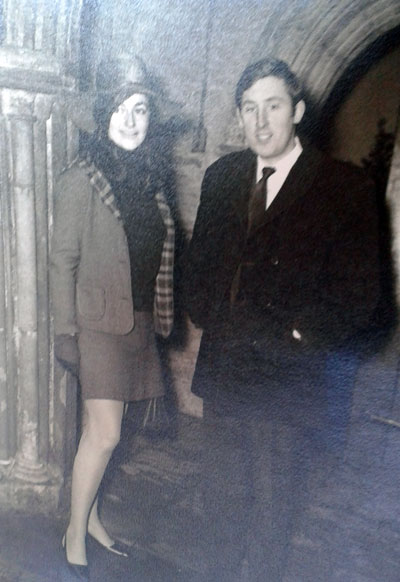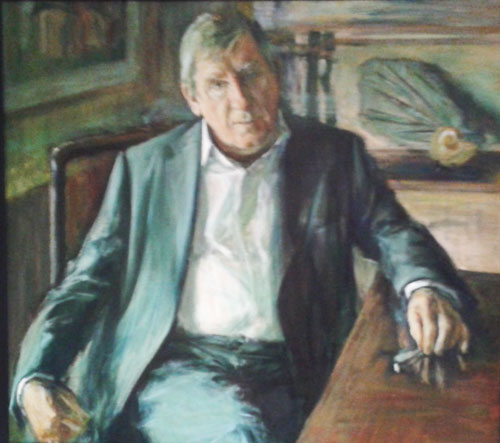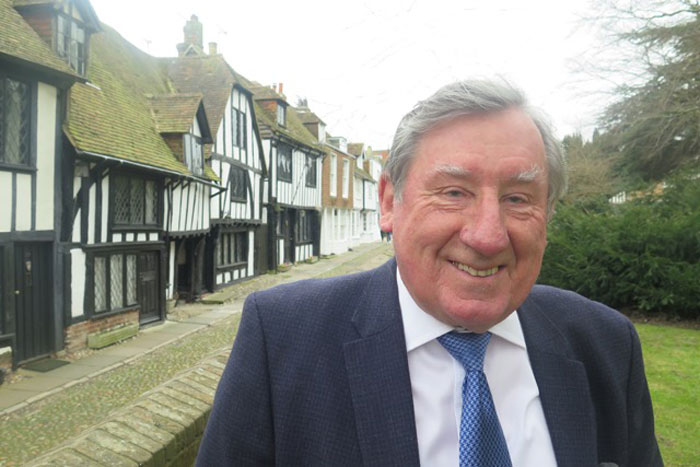Mike Eve is well known by locals as the driving force behind the state-of–the-art cinema in the centre of Rye. With the Kino now up and running, and having recently resigned as a Rye Town Councillor, Mike’s supportive wife Madeleine might have hoped he was ready to get out his golf clubs and have a quiet life.
But Mike clearly isn’t ready for retirement yet and has just been elected as Chair of the Rye Arts Festival. For our Ryers Unwrapped series I wanted to discover more about this energetic, community minded entrepreneur and his vision for the future.
Mike and Madeleine were weekenders from 1997, staying in Rye regularly with their children Amanda and Roland. In 2006, when both their children had left university (Mike is very proud that they both got 1sts at Oxford and St Andrew’s respectively) they sold up in London and moved to Rye full time.
Both Mike and Madeleine have had a positive influence on the town. Madeleine runs the sweet smelling Forget Me Not gift shop in Lion Street as well as running beading workshops, whilst Mike applies his strategic thinking and energy to a range of projects.
A great networker, who effortlessly works any room to find out what skills individuals can bring to the town, he belongs to many local social and business groups including the aptly named ROMEOs (Rye Old Men Eating Out).
One of his first ventures in Rye was to set up the Rye Fund with Kenneth Bird , Christopher Strangeways and Robert Bromley which this year alone gave £7,000 to local causes.
His interest in working to better his local community led him to join the Campaign for Democratic Rye formed by Dr Keith Taylor and he was elected a Rye Town Councillor. “It was a frustrating experience. With one dominant party at district and county level it was very hard to influence anything and there were no powers to make change”.
Mike’s vision and management of the cinema project has been a big boost for tourism as well as a great resource for locals. The two screen cinema and cafe project resulted from a suggestion by the late Freddie Lees to build on the Jacobean playwright John Fletcher’s connection with Rye and the Fletcher group was formed.
Various ideas were floated, one of which was to buy the Monastery in Conduit Hill and convert it into a theatre and arts complex, but problems relating to dealing with a Grade I listed building proved insurmountable.
At the same time the Save the Library group had formed to stop the Library and Lion Street Centre being developed into up-market housing and the iconic art room from being demolished. After months of campaigning Mike and his team set up the Fletcher in Rye CIC and St Mary’s Church PCC succeeded in buying the Lion Street site from South Coast College Hastings.
Mike came up with the idea of a partnership with the Kino cinema in Hawkhurst, and so the Rye Kino was born. Hugh Kermode worked tirelessly with Mike on developing the cinema and you can see the full story on his Fletcher in Rye blog.
Born in 1941 in Cambridge and brought up in Glemsford, Suffolk, Mike understood hard work from an early age. “My grandfather owned a bakery which he ran with my father and his brother-in-law. It was incredibly hard work with unsocial hours, and we were all expected to help out with the family business”.
Mike’s parents were bright but had not had opportunities to develop academically, so they were very ambitious for him. “My father left school at 15 and became a trainee gardener prior to joining the family business and then joined the Catering Corp during the war”.
Mike inherited his strong sense of community from his parents. “My mother was in service and was a pillar of the community as well as a fantastic mother and cook . We grew all our own vegetables at a time when shops only had tinned food and rationing was still in force”.
Mike’s entrepreneurial skills and interest in mergers and acquisitions (of both the business and female varieties) showed themselves early on – “I was a teenager doing bakery delivery rounds when I came up with the idea of our bakery teaming up with the milkman in the next village who happened to have a very attractive daughter –an art student”.
“The one early event which was massively important was that I passed the eleven plus. That day was crucial in my life”. After Sudbury Grammar School, he went to Manchester University to read Chemical Engineering and Management Studies. “I was delighted to leave rural life behind and I had three wonderful years studying, hitchhiking, taking on summer jobs and enjoying all the attractions that a city offers”.

He left university in 1959 at the time of the rebirth of advertising agencies. “We were all trying to get into the world of Mad Men – new ideas, whisky and women, but I didn’t make it and settled instead for a job as a marketing graduate with Michelin Tyres”.
That led him to London, which he loved, and life in a very small shared flat in Notting Hill Gate. This was the time of Peter Rachman, and with his political and community interests triggered Mike stood, unsuccessfully, for election as a Liberal candidate in the area. But not all was lost as he met his wife Madeleine, a trainee nurse from St. Thomas’s, at Young Liberals and love blossomed.

A young, ambitious man in a hurry he moved in to market research for the Metal Box Company at the beginning of the boom in recycled packaging and plastics. That was followed by Rank Xerox who with a new venture converted a huge empty film studio in Denham as an office/ warehouse. “It was a very exciting time. We were all new – all in our 20s – ambitious and inspired by a motivational boss who infected us with his ideas and lateral thinking”.
A move to PA Management as a management consultant followed. “I loved it. We were all trained to think laterally and to look for ways of doing things differently. We were aware that we were being charged out at huge daily rates and we had to find solutions and make a difference”. Time spent in Iran in the time of the Shah and in Jamaica, Bermuda and America, developed his interest in culture management and ways of changing attitudes.
At the age of 35 he was headhunted and had his first job in the City of London with a global insurance broker. Other senior roles in the industry followed and his final post was as CEO of AON (UK) insurance brokers. “We undertook many acquisitions and mergers with my staff numbers swelling from 300 to 3000, I had to bring together people from three distinct corporate brands. I had to say “forget the past, this is what we stand for”, and build on common experiences to bring people together to work as a team”. Strategic thinking, analysis and good teamwork have obviously played an important part in Mike’s success.

Following a long line of Chairs to the Rye Arts Festival (RAF) which is just preparing its 45th programme, Mike is looking forward to building on the hard work already started by the outgoing chair Ian Graham-Bryce and his team. Of his goals he says “The cinema has added a new dimension to the arts in Rye, particularly the live feed bringing West End theatre, ballet and opera to Rye at affordable prices.
“The cinema is part of the digital revolution in the way people can now access the arts. But it doesn’t offer face to face performance. The live element is very important and needs to be preserved and developed. I’d like to help this along the way and increase membership and open up the Festival to a wider audience.”
I’m sure we all wish him and the Committee great success. RAF diary dates are September 17 to October 1, 2016. The programme will be launched in July at www.ryeartsfestival.co.uk .
Rye News will be writing and reviewing events during and in the lead up to the Festival. Register free with Rye News to receive weekly email alerts and be kept up to date with the Festival and other cultural events in Rye. See our Culture section for current events.
Main photo: Hugh Kermode



